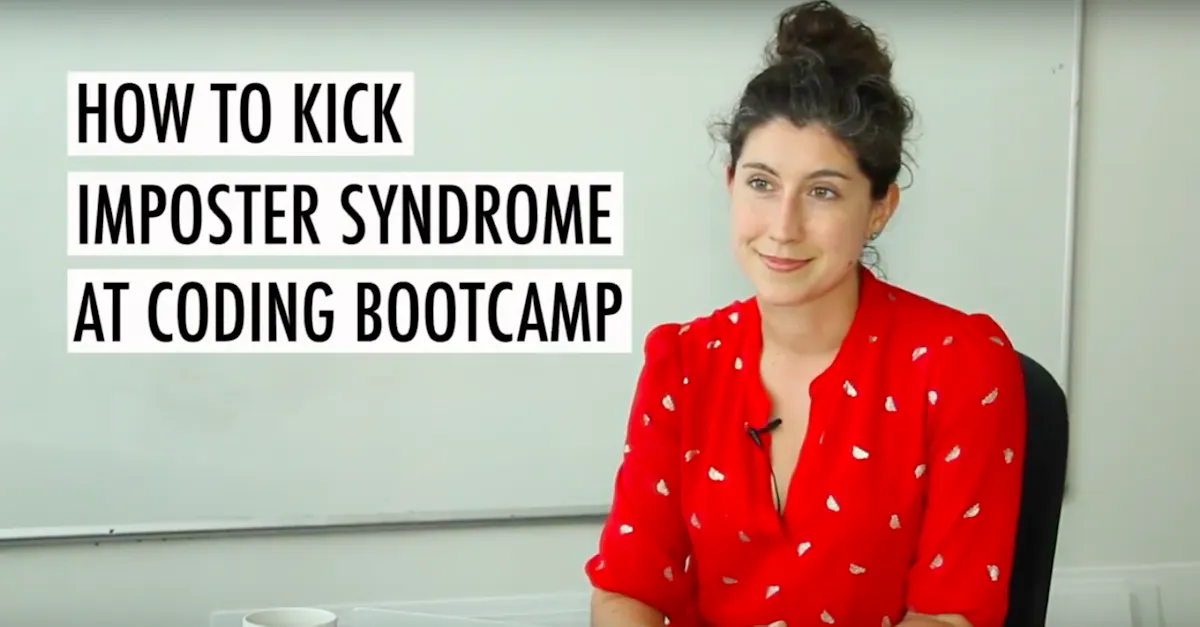Fill out the form to get more information about the Grace Hopper Program bootcamp of your choice.
10.27.2022
You Are Not a Fraud: How to Quell Your Imposter Syndrome and Keep Kicking Butt
By Meg Duffy

You Are Not a Fraud: How to Quell Your Imposter Syndrome and Keep Kicking Butt
Here, Watch Meg's impostor syndrome interview From Course Report's YouTube page.
Ever felt like your professional success is due to luck? Are you afraid your colleagues will realize they made a mistake in hiring you? When people praise you, do you believe them, or do you just worry you can’t meet their expectations? If any of this sounds familiar, you’re not alone. This inability to internalize accomplishments, and fear of being exposed as a fraud has a name. It’s called imposter syndrome, and it’s not uncommon.
For coding bootcampers who don’t have that traditional computer science degree, and for women in general who don’t have a ton of role models in software development, imposter syndrome is even more prevalent. But you don’t have to let it rule your life. Here are four tips to combat negative self talk and build confidence.
Be persistent
If programming were easy, everyone would do it. Lots of people think programming ability is innate, that it’s a way of thinking that you’re born with. But in reality, the best programmers turn out to be the ones who are most persistent. They’re willing to wrestle with tough problems, take a break, find a different approach, and power through until they find a solution.
It’s not unusual to find programming difficult if you’re just starting out. It doesn’t mean you’re not cut out to be a developer. Quite the opposite, in fact, . because if you’ve been accepted into a bootcamp, you’ve already demonstrated this most important of traits--persistence in learning on your own. Strengthening that tendency will help you get through the program, navigate the job search, and make you a great candidate for hire. Keep wrestling.
Cultivate a growth mindset
The structure of a coding bootcamp is a lot different than other educational models. In high school or college, you do your all your homework, you study for the multiple choice test, and you’ll probably pass it without having to actually demonstrate your knowledge.
At a bootcamp, it’s the opposite: the tests you take and the projects you build require that you apply the concepts you learn in class. And that takes some adjustment, especially if you’re a perfectionist who constantly compares your performance to other people’s. So trust the process, and try not to let your fear of failure keep you from applying what you’ve learned. You’re not going to get everything on the first try, but every concept you learn builds on every other, and each failure teaches you something important.
Cultivating a growth mindset, where you’re more focused on the learning process than the specific outcome, can be really challenging, especially for students who self-define as high achieving, but it’s a necessary component of success.
Curb negative self-talk
When you’re starting something new like programming, it’s easy to fall into the imposter syndrome trap. Everyone has that voice that tells them they’re not smart enough or experienced enough, but recognizing that you have control over that voice is really the key to stepping outside of your comfort zone and making moves.
The truth is that it’s impossible to know everything there is to know about programming. Everyone’s on a continuum, and there’s always going to be someone ahead of you and someone behind you in terms of skills. So comparing yourself to others will always be a losing game, and it’s important to catch yourself when you fall into that trap and short circuit that negative self-talk.
A helpful strategy is to talk to yourself the way you’d talk to a friend. If a friend were struggling and lacked confidence, you’d give them a pep talk and pump them up. Take that same compassionate tone when you’re speaking to yourself.
Remind yourself of previous achievements
A common symptom of imposter syndrome is an inability to internalize your accomplishments. Your successes aren’t flukes or purely luck; you’ve been successful because you work hard and get results. But when you’re struggling with a particular concept or task, it becomes difficult to keep things in perspective.
At times like these, when you start discounting your successes, it helps to have a tangible reminder of how far you’ve come. Before you dive into something new, write down a list of all your past achievements. Looking back at your GitHub, or even keeping a technical blog are great ways to remind yourself just how much you’ve learned in a short time.
Every day, track your progress by writing down one small accomplishment that you’re proud of. And when you hit a milestone or complete a project, show it off! There’s always more work ahead, so be sure to take time to acknowledge the hard work it took to achieve that goal. These little reminders can help you build substantial confidence--the kind of confidence that will shine through in interviews, at networking events, and in your first job as a developer.
None of these tips is a magic bullet; they require constant awareness and practice. But if you implement them consistently over time, you’ll see results.


